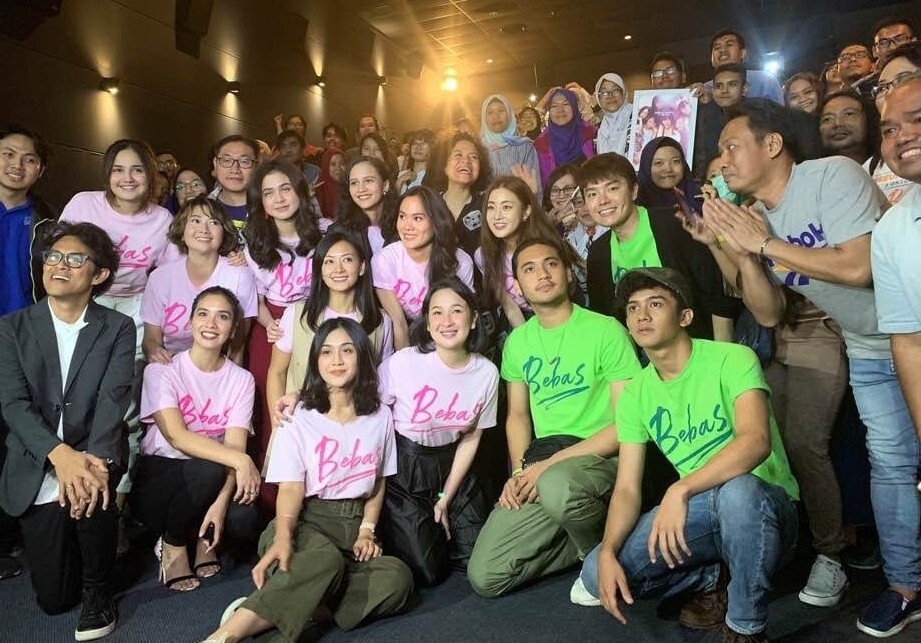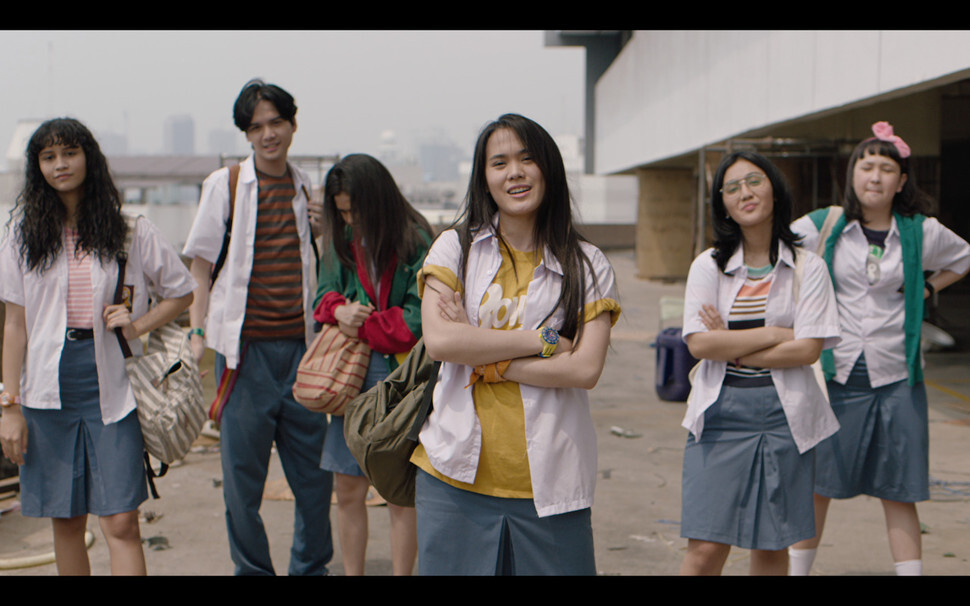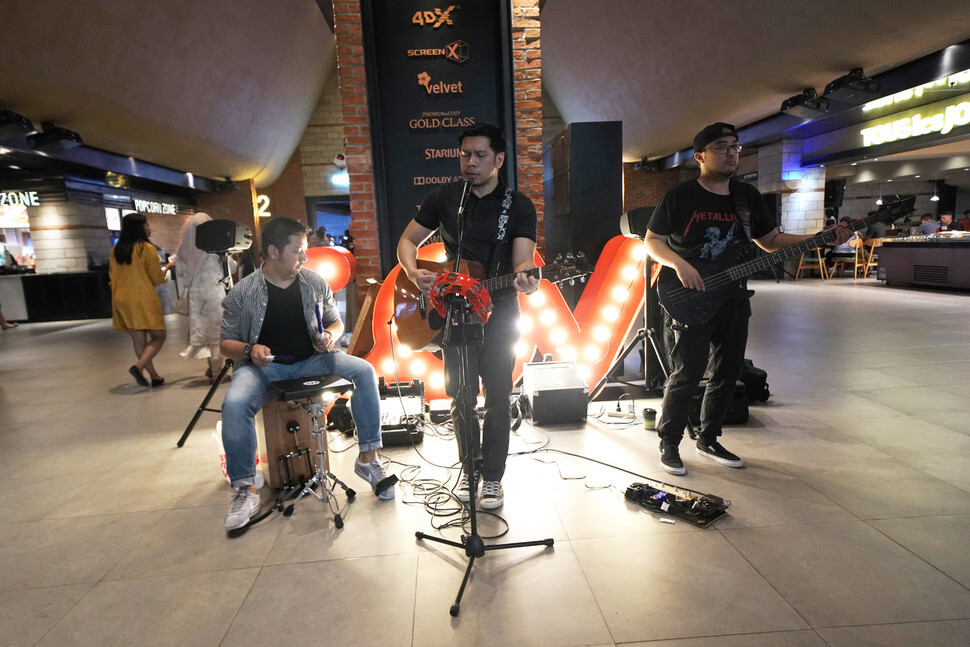hankyoreh
Links to other country sites 다른 나라 사이트 링크
[Reportage] Korean film sees new horizons in Southeast Asia

“I love you, Kang So-ra!” “You look so pretty!”
On the evening of Oct. 9, Korean phrases could be heard in a theater at CGV’s Grand Indonesia branch, in Jakarta. They were being shouted by Indonesian theatergoers.
Korean actress Kang So-ra briefly greeted the audience from the stage and then joined them to watch the film “Bebas.”
Kang wasn’t a member of the “Bebas” cast, however. The film is a remake of “Sunny,” the Korean film in which Kang played the lead role. Even so, theatergoers recognized the star of the original film and gave her a warm welcome.
“Bebas” retains the overall narrative of the original while customizing some of the setting to Indonesia. Instead of a girls’ high school, there’s a coed high school with a male character, and the classic pop songs from the original are replaced with Indonesian hits from the 1990s.
Throughout the film, the theater rang with laughter and applause. Some theatergoers even danced and sang along with the final song. Kang So-ra stood up and danced right beside them.
“I liked the candid reactions of the audience. While seeing the Indonesian audience laughing at the same points as Korean audiences did, I found myself thinking that audiences have similar emotional responses no matter which country you’re in,” Kang said.
“Bebas” had a hard time at first because it was going up against the Hollywood blockbuster “Joker.” But word of mouth kept theaters full into the fourth week after its release; by Oct. 31 it had sold more than 500,000 tickets. People often returned for a second viewing, leading to “sing-along showings.”
30-year-old Rybicki Morais explained that she had seen both “Sunny” and “Bebas.” “I got into Korean cinema after seeing ‘Sunny’ for the first time. Korean films seem to say a lot of things I’d never thought of before. I think it would also be fun to see a remake of ‘Extreme Job.’”

Korean cinema is all the rage in Southeast Asia. This goes beyond merely screening Korean films, however: it’s becoming increasingly common for Korean film companies to partner with local firms to remake Korean films or do original productions. Taking the lead in these efforts is CJ ENM, Korea’s top film investor and distributor. The company is seeking new markets in Vietnam, Thailand, and Indonesia, countries with great potential for growth, in an attempt to overcome stagnation in the domestic market.
“Even though these countries are enjoying rapid economic growth and household purchasing power is expanding, people only watch an average of 0.5 films a year (as of 2017). That shows how much growth potential there is,” said Koh Gyeong-beom, head of the overseas business department at CJ ENM’s film headquarters.
Indonesia in particular has a huge population: 260 million, the fourth largest in the world. Its film market is valued at US$307 million, ranked first in Southeast Asia and 15th worldwide. Since its first Indonesian release — “A Werewolf Boy,” in 2013 — through this year, CJ ENM has distributed some 40 Korean films in the country, including “Snowpiercer,” “The Admiral: Roaring Currents,” and “Parasite.”
The company began investing and producing its own films in 2016, 10 of which have been released so far. “Sweet 20,” a remake of “Miss Granny,” ranked 11th among films released in Indonesia in 2017, while “Satan’s Slaves,” a horror film that came out the same year, had the best box office showing of any local film. “Satan’s Slaves” was directed by Joko Anwar, who partnered with CJ for his latest film “Impetigore.” The film is already dominating box offices, bringing in more than 1 million viewers just nine days after its release.
Indonesian filmmakers say that the strengths of Korean films are their well-constructed plots and their balance of artistry and mass appeal.
“We have a lot of IP [intellectual property] in Indonesia that could be turned into films, but dramatizing it isn’t easy. We decided to do a joint production because I think there’s something we can learn from remaking well-made Korean films,” said Mira Lesmana, producer of “Bebas” and president of Miles Productions.
“The unique thing about Korean films is that many of them are crowd pleasers while also having the vibe of an art film. Some good examples are the films of Lee Chang-dong, Park Chan-wook, and Bong Joon-ho,” said Riri Riza, director of “Bebas” and one of Indonesia’s hottest directors.
“Some recent Korean films that have left an impression on me are ‘The Gangster, the Cop, the Devil’ and ‘Swing Kids.’ If I have the opportunity, I’d like to remake ‘Memories of Murder’ and ‘The Gangster, the Cop, the Devil.’”

If films are the software of the movie business, theaters are the hardware, and that’s an area where Korean companies have also been busily making inroads in Southeast Asia.
In 2011, CJ CGV bought the number one theater chain in Vietnam, propelling it to the top of the industry with a single deal. Since then, it has expanded the seven original multiplexes to 78, giving the company a market share of more than 51% as of this past September.
CGV also moved into Indonesia’s theater industry in 2013. It began by operating an existing theater chain under contract and completed the transition to the CGV brand in 2017. It now runs 63 multiplexes, up from the initial nine, and the number of theatregoers, which stood at 4.26 million when CGV began operations there, is almost certain to top 20 million this year.
CGV has closed the gap with Cinema 21, the largest cinema chain in Indonesia, which once boasted an overwhelming 92% market share. Today, CGV is the second-largest player in the market, with a 20% share, and it’s on the heels of market leader Cinema 21, at 59%.
One of the major factors contributing to this rapid rise is the concept of a “culture complex,” which sets CGV apart from other theaters. “We realized we had no chance of success if we just showed films like the number one theater chain, so we opted to become an entertainment platform,” explained Kim Gyeong-tae, head of CGV’s Indonesian office.
So the company organized concerts in its theater lobbies and screening rooms and tore down some of its rooms to build “sports halls” with basketball and futsal courts. On Oct. 26, Kim So-hui, a singer whose career was launched by the television show “Produce 101,” held a concert in the sports hall at CGV’s FX branch.
“Considering the popularity of K-pop, we’re also thinking about setting up a K-pop dance school in our theaters,” said Lee Jeong-jae, a manager at CGV’s Indonesian branch.
“I like BTS, but I didn’t even know that CGV is a Korean company. I come here twice a month because the facilities are clean and they show a variety of films,” said 13-year-old Brigita, who spoke with the Hankyoreh at CGV’s FX branch on Oct. 11.

CGV also serves as something of an evangelist for Korean films and local films. Its theaters play a lot of Korean films that aren’t shown by the number one cinema chain, and it also holds regular film festivals featuring Korean and Indonesian entries. Fifteen of the latest Korean films, including “The Bad Guys: Reign of Chaos,” “Exit,” and “Parasite,” were screened in the 10th Korea-Indonesia Film Festival, which was held in five Indonesian cities on Oct. 10-13.
Convinced that growth in local films is required for the development of the film industry as a whole, CGV has also doubled the number of local films that it screens. As a result, ticket sales for local films at the chain have increased by a factor of 17.
“The growth of local films is driving more exchange and cooperation with Korean films. Our goal is to spread the Korean Wave in cinema while also contributing to mutual growth,” Kim Gyeong-tae said.
By Suh Jung-min, music correspondent
Please direct comments or questions to [english@hani.co.kr]

Editorial・opinion
![[Editorial] Does Yoon think the Korean public is wrong? [Editorial] Does Yoon think the Korean public is wrong?](https://flexible.img.hani.co.kr/flexible/normal/500/300/imgdb/original/2024/0417/8517133419684774.jpg) [Editorial] Does Yoon think the Korean public is wrong?
[Editorial] Does Yoon think the Korean public is wrong?![[Editorial] As it bolsters its alliance with US, Japan must be accountable for past [Editorial] As it bolsters its alliance with US, Japan must be accountable for past](https://flexible.img.hani.co.kr/flexible/normal/500/300/imgdb/original/2024/0417/6817133413968321.jpg) [Editorial] As it bolsters its alliance with US, Japan must be accountable for past
[Editorial] As it bolsters its alliance with US, Japan must be accountable for past-
[Guest essay] Amending the Constitution is Yoon’s key to leaving office in public’s good graces
-
[Editorial] 10 years on, lessons of Sewol tragedy must never be forgotten
-
[Column] A death blow to Korea’s prosecutor politics
-
[Correspondent’s column] The US and the end of Japanese pacifism
-
[Guest essay] How Korea turned its trainee doctors into monsters
-
[Guest essay] As someone who helped forge Seoul-Moscow ties, their status today troubles me
-
[Editorial] Koreans sent a loud and clear message to Yoon
-
[Column] In Korea’s midterm elections, it’s time for accountability
Most viewed articles
- 1‘Right direction’: After judgment day from voters, Yoon shrugs off calls for change
- 2[Editorial] Does Yoon think the Korean public is wrong?
- 3Strong dollar isn’t all that’s pushing won exchange rate into to 1,400 range
- 4Where Sewol sank 10 years ago, a sea of tears as parents mourn lost children
- 5Japan officially says compensation of Korean forced laborers isn’t its responsibility
- 6[Editorial] As it bolsters its alliance with US, Japan must be accountable for past
- 7[News analysis] Watershed augmentation of US-Japan alliance to put Korea’s diplomacy to the test
- 8Korea ranks among 10 countries going backward on coal power, report shows
- 9Faith in the power of memory: Why these teens carry yellow ribbons for Sewol
- 10[Guest essay] Amending the Constitution is Yoon’s key to leaving office in public’s good graces